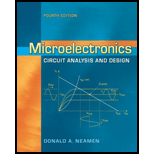
A silicon pn junction diode at
a.
The forward-bias diode current for different values of
Answer to Problem 1.7TYU
For
For
For
Explanation of Solution
Given Information:
Calculation:
For
The diode current equation is:
The thermal voltage is determined as:
k = Boltzmann’s constant
The value of diode current is:
Hence, the value of forward bias diode current is,
For
The diode current equation is:
The thermal voltage is determined as:
k = Boltzmann’s constant
The value of diode current is:
Hence, the value of forward bias diode current is,
For
The diode current equation is:
The thermal voltage is determined as:
k = Boltzmann’s constant
The value of diode current is:
Hence, the value of forward bias diode current is,
b.
The reverse-bias diode current for different values of
Answer to Problem 1.7TYU
For
For
Explanation of Solution
Given Information:
Calculation:
For
The diode current equation is:
The thermal voltage is determined as:
k = Boltzmann’s constant
The value of diode current is:
Hence, the value of reverse-bias diode current is,
For
The diode current equation is:
The thermal voltage is determined as:
k = Boltzmann’s constant
The value of diode current is:
Hence, the value of reverse-bias diode current is,
Want to see more full solutions like this?
Chapter 1 Solutions
Microelectronics: Circuit Analysis and Design
- Q4: (A) Find the mean of a random variable X if S f(x)= 2x 0 2 for 0arrow_forward(A) Suopces the current measurements in a strip of wire are normally distributed with ca-10(mA) and a varieocom (mA)² 1- What is the probability that a current measurement lies between 7.4 and 11.6 mA? 2-Drew the probability density function of the current distribution. (8) A factory produces light bulbs with a koown probability of P(D)-0.08 that & bulo is dalective. If a bulb is defective, the probability that the quality control test detects it is defective is P(TID)-0.90. Conversely, if a bulb is not defective, the probability that the test Telesly indicaton k as defective is P(TID)-0.05. calculate the probability that a light b is notually defective given that the test result is positive, F(DIT).arrow_forwardTitle: Modelling and Simulating Boost Converter Battery Charging Powered by PV Solar Question: I need a MATLAB/Simulink model for a Boost Converter used to charge a battery, powered by a PV solar panel. The model should include: 1. A PV solar panel as the input power source. 2. A Boost Converter circuit for voltage regulation. 3. A battery charging system. 4. Simulation results showing voltage, current, and efficiency of the system. Please provide the Simulink file and any necessary explanations.arrow_forwardQ1. A 450 V, 50 Hz, 1450 r.p.m., 25 kW, star-connected three-phase induction motor delivers constant (rated) torque at all speeds. The motor equivalent circuit parameters at rated frequency are R1=0.12, R2 = 0.17 2, X₁ = 0.3 2, X2 = 0.5 2, Xm = 23.6 2. Smooth speed variation is obtained by primary frequency control with simultaneous variation of the terminal voltage to maintain constant air-gap flux. Calculate the motor current, power factor and efficiency at one-fifth of rated speed.arrow_forwardQ2. Drive the transformations for currents between a rotating balanced two phase (a,ẞ) winding and a pseudo stationary two phase (d,q) wingding.arrow_forwardThe formulas that should be used to solve the question are in the second picture, also B = k/n a= l/carrow_forwardarrow_back_iosSEE MORE QUESTIONSarrow_forward_ios
 Introductory Circuit Analysis (13th Edition)Electrical EngineeringISBN:9780133923605Author:Robert L. BoylestadPublisher:PEARSON
Introductory Circuit Analysis (13th Edition)Electrical EngineeringISBN:9780133923605Author:Robert L. BoylestadPublisher:PEARSON Delmar's Standard Textbook Of ElectricityElectrical EngineeringISBN:9781337900348Author:Stephen L. HermanPublisher:Cengage Learning
Delmar's Standard Textbook Of ElectricityElectrical EngineeringISBN:9781337900348Author:Stephen L. HermanPublisher:Cengage Learning Programmable Logic ControllersElectrical EngineeringISBN:9780073373843Author:Frank D. PetruzellaPublisher:McGraw-Hill Education
Programmable Logic ControllersElectrical EngineeringISBN:9780073373843Author:Frank D. PetruzellaPublisher:McGraw-Hill Education Fundamentals of Electric CircuitsElectrical EngineeringISBN:9780078028229Author:Charles K Alexander, Matthew SadikuPublisher:McGraw-Hill Education
Fundamentals of Electric CircuitsElectrical EngineeringISBN:9780078028229Author:Charles K Alexander, Matthew SadikuPublisher:McGraw-Hill Education Electric Circuits. (11th Edition)Electrical EngineeringISBN:9780134746968Author:James W. Nilsson, Susan RiedelPublisher:PEARSON
Electric Circuits. (11th Edition)Electrical EngineeringISBN:9780134746968Author:James W. Nilsson, Susan RiedelPublisher:PEARSON Engineering ElectromagneticsElectrical EngineeringISBN:9780078028151Author:Hayt, William H. (william Hart), Jr, BUCK, John A.Publisher:Mcgraw-hill Education,
Engineering ElectromagneticsElectrical EngineeringISBN:9780078028151Author:Hayt, William H. (william Hart), Jr, BUCK, John A.Publisher:Mcgraw-hill Education,





